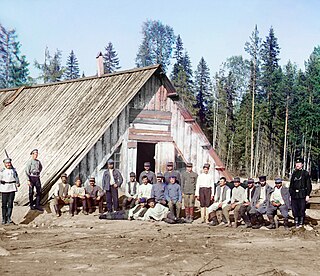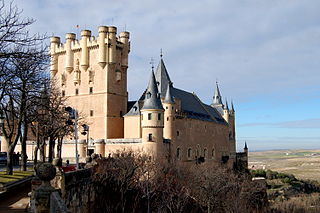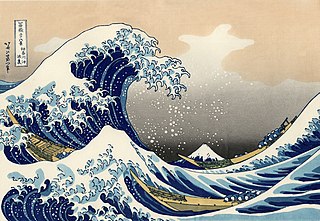
The Auschwitz concentration camp was a complex of over 40 concentration and extermination camps built and operated by Nazi Germany in occupied Poland during World War II and the Holocaust. It consisted of Auschwitz I, the main camp (Stammlager) and administrative headquarters, in Oświęcim; Auschwitz II–Birkenau, a combined concentration/extermination camp three kilometers away in Brzezinka; Auschwitz III–Monowitz, a labor camp seven kilometers from Auschwitz I, set up to staff an IG Farben synthetic-rubber factory; and dozens of other subcamps.

A cruiser is a type of warship. Modern cruisers are generally the largest ships in a fleet after aircraft carriers and amphibious assault ships, and can usually perform several roles.

Nazi Germany built extermination camps during the Holocaust in World War II, to systematically kill millions of Jews, Slavs, Poles, Roma, Soviet POWs, political opponents and others whom the Nazis considered "Untermenschen" ("subhumans"). The victims of death camps were primarily killed by gassing, either in permanent installations constructed for this specific purpose, or by means of gas vans. Some Nazi camps, such as Auschwitz and Majdanek, served a dual purpose before the end of the war in 1945: extermination by poison gas, but also through extreme work under starvation conditions.

A frigate is a type of warship, having various sizes and roles over the last few centuries.

The Geheime Staatspolizei, abbreviated Gestapo, was the official secret police of Nazi Germany and German-occupied Europe.

The Kriegsmarine was the navy of Nazi Germany from 1935 to 1945. It superseded the Imperial German Navy of the German Empire (1871–1918) and the inter-war Reichsmarine (1919–1935) of the Weimar Republic. The Kriegsmarine was one of three official branches, along with the Heer (Army) and the Luftwaffe of the Wehrmacht, the German armed forces from 1933 to 1945.

A prisoner of war (POW) is a person, whether combatant or non-combatant, who is held in custody by a belligerent power during or immediately after an armed conflict. The earliest recorded usage of the phrase "prisoner of war" dates to 1660.

The Stonewall riots were a series of spontaneous, violent demonstrations by members of the gay (LGBT) community against a police raid that took place in the early morning hours of June 28, 1969, at the Stonewall Inn in the Greenwich Village neighborhood of Manhattan, New York City. They are widely considered to constitute the most important event leading to the gay liberation movement and the modern fight for LGBT rights in the United States.

A castle is a type of fortified structure built during the Middle Ages by predominantly the nobility or royalty and by military orders. Scholars debate the scope of the word castle, but usually consider it to be the private fortified residence of a lord or noble. This is distinct from a palace, which is not fortified; from a fortress, which was not always a residence for royalty or nobility; and from a fortified settlement, which was a public defence – though there are many similarities among these types of construction. Usage of the term has varied over time and has been applied to structures as diverse as hill forts and country houses. Over the approximately 900 years that castles were built, they took on a great many forms with many different features, although some, such as curtain walls and arrowslits, were commonplace.

The Tokugawa Shogunate, also known as the Tokugawa Bakufu (徳川幕府) and the Edo Bakufu (江戸幕府), was the last feudal Japanese military government, which existed between 1603 and 1867. The head of government was the shōgun, and each was a member of the Tokugawa clan. The Tokugawa shogunate ruled from Edo Castle and the years of the shogunate became known as the Edo period. This time is also called the Tokugawa period or pre-modern.

A kibbutz is a collective community in Israel that was traditionally based on agriculture. The first kibbutz, established in 1909, was Degania. Today, farming has been partly supplanted by other economic branches, including industrial plants and high-tech enterprises. Kibbutzim began as utopian communities, a combination of socialism and Zionism. In recent decades, some kibbutzim have been privatized and changes have been made in the communal lifestyle. A member of a kibbutz is called a kibbutznik.

The Edo period or Tokugawa period (徳川時代) is the period between 1603 and 1868 in the history of Japan, when Japanese society was under the rule of the Tokugawa shogunate and the country's 300 regional daimyō. The period was characterized by economic growth, strict social order, isolationist foreign policies, a stable population, "no more wars", and popular enjoyment of arts and culture. The shogunate was officially established in Edo on March 24, 1603, by Tokugawa Ieyasu. The period came to an end with the Meiji Restoration on May 3, 1868, after the fall of Edo.

The Irish War of Independence or Anglo-Irish War was a guerrilla war fought in Ireland from 1919 to 1921 between the Irish Republican Army and British forces: the British Army, along with the quasi-military Royal Irish Constabulary (RIC) and its paramilitary forces the Auxiliaries and Ulster Special Constabulary (USC). It was an escalation of the Irish revolutionary period into warfare.

Trench warfare is a type of land warfare using occupied fighting lines consisting largely of military trenches, in which troops are well-protected from the enemy's small arms fire and are substantially sheltered from artillery. The most famous use of trench warfare is the Western Front in World War I. It has become a byword for stalemate, attrition, sieges, and futility in conflict.

A brothel or bordello is a place where people engage in sexual activity with prostitutes. Technically, any premises where prostitution commonly takes place qualifies as a brothel. However, for legal or cultural reasons, establishments often describe themselves as massage parlors, bars, strip clubs, body rub parlours, studios, or by some other description. Sex work in a brothel is considered safer than street prostitution.

Nazi Germany maintained concentration camps throughout the territories it controlled before and during the Second World War. The first Nazi camps were erected in Germany in March 1933 immediately after Hitler became Chancellor and his Nazi Party was given control of the police by Reich Interior Minister Wilhelm Frick and Prussian Acting Interior Minister Hermann Göring. Used to hold and torture political opponents and union organizers, the camps initially held around 45,000 prisoners. In 1933–1939, before the onset of war, most prisoners consisted of German Communists, Socialists, Social Democrats, Roma, Jehovah's Witnesses, homosexuals, and persons accused of 'asocial' or socially 'deviant' behavior by the Germans.

Apartheid was a system of institutionalised racial segregation that existed in South Africa from 1948 until the early 1990s. Apartheid was characterised by an authoritarian political culture based on baasskap, which encouraged state repression of Black African, Coloured, and Asian South Africans for the benefit of the nation's minority white population. The economic legacy and social effects of apartheid continue to the present day.

The Nuremberg Laws were antisemitic and racial laws in Nazi Germany. They were enacted by the Reichstag on 15 September 1935, at a special meeting convened during the annual Nuremberg Rally of the Nazi Party (NSDAP). The two laws were the Law for the Protection of German Blood and German Honour, which forbade marriages and extramarital intercourse between Jews and Germans and the employment of German females under 45 in Jewish households; and the Reich Citizenship Law, which declared that only those of German or related blood were eligible to be Reich citizens; the remainder were classed as state subjects, without citizenship rights. A supplementary decree outlining the definition of who was Jewish was passed on 14 November, and the Reich Citizenship Law officially came into force on that date. The laws were expanded on 26 November 1935 to include Romani people. This supplementary decree defined Romanis as "enemies of the race-based state", the same category as Jews.

RMS Titanic was a British passenger liner that sank in the North Atlantic Ocean in 1912, after colliding with an iceberg during her maiden voyage from Southampton to New York City. Of the estimated 2,224 passengers and crew aboard, more than 1,500 died, making it one of modern history's deadliest commercial marine disasters during peacetime. RMS Titanic was the largest ship afloat at the time she entered service and was the second of three Olympic-class ocean liners operated by the White Star Line. She was built by the Harland and Wolff shipyard in Belfast. Thomas Andrews, chief naval architect of the shipyard at the time, died in the disaster.
Nazi human experimentation was a series of medical experiments on large numbers of prisoners, including children, by Nazi Germany in its concentration camps in the early to mid 1940s, during World War II and the Holocaust. Chief target populations included Romani, Sinti, ethnic Poles, Soviet POWs, disabled Germans, and Jews from across Europe.






















